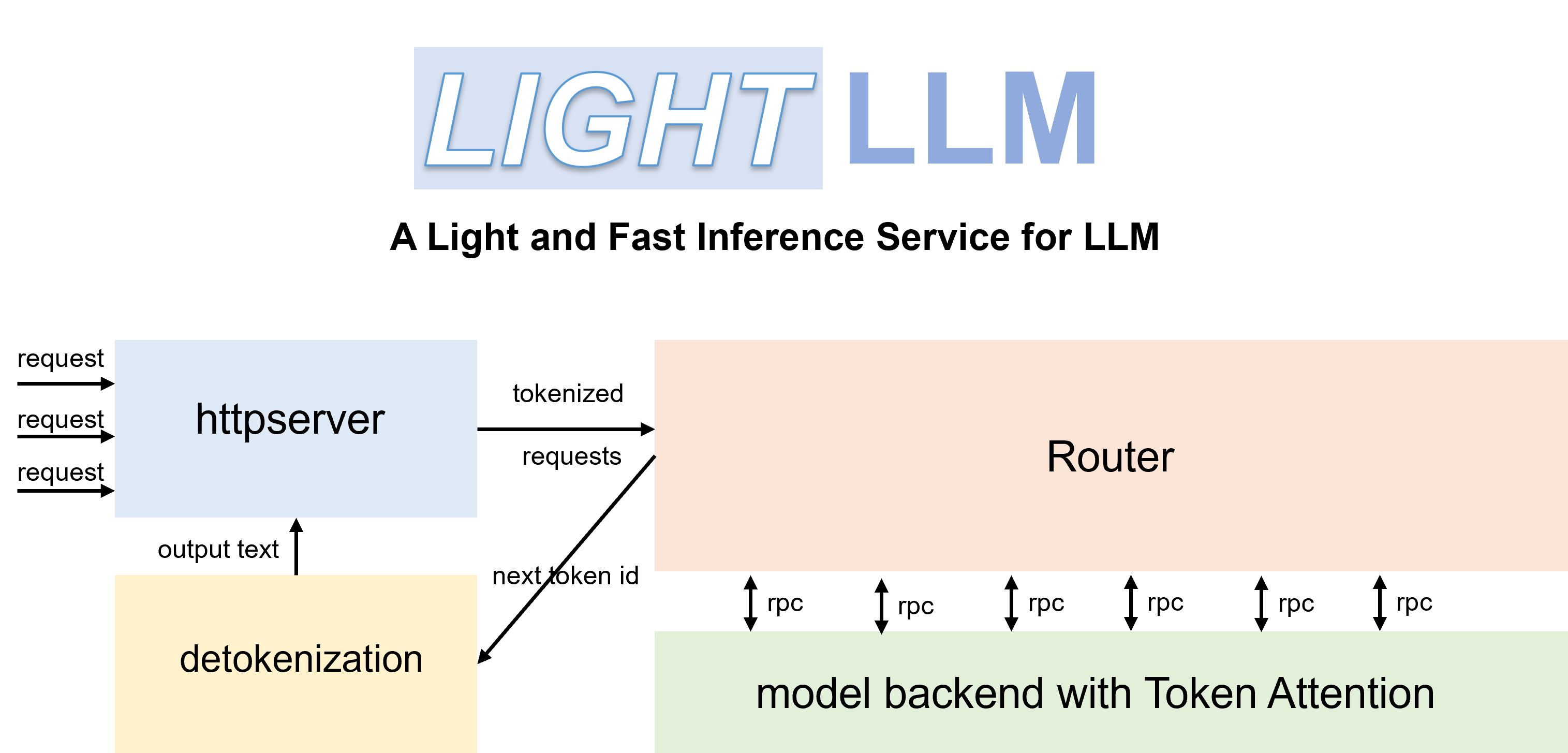
LightLLM is a Python-based LLM (Large Language Model) inference and serving framework, notable for its lightweight design, easy scalability, and high-speed performance. LightLLM harnesses the strengths of numerous well-regarded open-source implementations, including but not limited to FasterTransformer, TGI, vLLM, and FlashAttention.
- Tri-process asynchronous collaboration: tokenization, model inference, and detokenization are performed asynchronously, leading to a considerable improvement in GPU utilization.
- Nopad (Unpad): offers support for nopad attention operations across multiple models to efficiently handle requests with large length disparities.
- Dynamic Batch: enables dynamic batch scheduling of requests
- FlashAttention: incorporates FlashAttention to improve speed and reduce GPU memory footprint during inference.
- Tensor Parallelism: utilizes tensor parallelism over multiple GPUs for faster inference.
- Token Attention: implements token-wise's KV cache memory management mechanism, allowing for zero memory waste during inference.
- High-performance Router: collaborates with Token Attention to meticulously manage the GPU memory of each token, thereby optimizing system throughput.
- Int8KV Cache: This feature will increase the capacity of tokens to almost twice as much. only llama support.
When you start Qwen-7b, you need to set the parameter '--eos_id 151643 --trust_remote_code'.
ChatGLM2 needs to set the parameter '--trust_remote_code'.
Baichuan needs to set the parameter '--trust_remote_code'.
InternLM needs to set the parameter '--trust_remote_code'.
The code has been tested with Pytorch>=1.3, CUDA 11.8, and Python 3.9. To install the necessary dependencies, please refer to the provided requirements.txt and follow the instructions as
pip install -r requirements.txtYou can use the official Docker container to run the model more easily. To do this, follow these steps:
-
Pull the container from the GitHub Container Registry:
docker pull ghcr.io/modeltc/lightllm:main
-
Run the container with GPU support and port mapping:
docker run -it --gpus all -p 8080:8080 \ -v your_local_path:/data/ \ ghcr.io/modeltc/lightllm:main /bin/bash -
Alternatively, you can build the container yourself:
docker build -t <image_name> . docker run -it --gpus all -p 8080:8080 \ -v your_local_path:/data/ \ <image_name> /bin/bash
-
You can also use a helper script to launch both the container and the server:
python tools/quick_launch_docker.py --help
-
Note: If you use multiple GPUs, you may need to increase the shared memory size by adding
--shm-sizeto thedocker runcommand.
- Install from the source code by
python setup.py installThe code has been tested on a range of GPUs including A100, A800, 4090, and H800. If you are running the code on A100, A800, etc., we recommend using triton==2.0.0.dev20221202. If you are running the code on H800, etc., it is necessary to compile and install the source code of triton==2.1.0 from the GitHub repository. If the code doesn't work on other GPUs, try modifying the triton kernel used in model inference.
With efficient Routers and TokenAttention, LightLLM can be deployed as a service and achieve the state-of-the-art throughput performance.
Launch the server:
python -m lightllm.server.api_server --model_dir /path/llama-7B \
--host 0.0.0.0 \
--port 8080 \
--tp 1 \
--max_total_token_num 120000The parameter max_total_token_num is influenced by the GPU memory of the deployment environment. A larger value for this parameter allows for the processing of more concurrent requests, thereby increasing system concurrency. For more startup parameters, please refer to api_server.py or ApiServerArgs.md.
To initiate a query in the shell:
curl http://127.0.0.1:8080/generate \
-X POST \
-d '{"inputs":"What is AI?","parameters":{"max_new_tokens":17, "frequency_penalty":1}}' \
-H 'Content-Type: application/json'To query from Python:
import time
import requests
import json
url = 'http://localhost:8080/generate'
headers = {'Content-Type': 'application/json'}
data = {
'inputs': 'What is AI?',
"parameters": {
'do_sample': False,
'ignore_eos': False,
'max_new_tokens': 1024,
}
}
response = requests.post(url, headers=headers, data=json.dumps(data))
if response.status_code == 200:
print(response.json())
else:
print('Error:', response.status_code, response.text)We compared the service performance of LightLLM and vLLM==0.1.2 on LLaMA-7B using an A800 with 80G GPU memory.
To begin, prepare the data as follows:
wget https://huggingface.co/datasets/anon8231489123/ShareGPT_Vicuna_unfiltered/resolve/main/ShareGPT_V3_unfiltered_cleaned_split.jsonLaunch the service:
python -m lightllm.server.api_server --model_dir /path/llama-7b --tp 1 --max_total_token_num 121060 --tokenizer_mode autoEvaluation:
cd test
python benchmark_serving.py --tokenizer /path/llama-7b --dataset /path/ShareGPT_V3_unfiltered_cleaned_split.json --num-prompts 2000 --request-rate 200The performance comparisons results are presented below:
| vLLM | LightLLM |
|---|---|
| Total time: 361.79 s Throughput: 5.53 requests/s |
Total time: 188.85 s Throughput: 10.59 requests/s |
For debugging, we offer static performance testing scripts for various models. For instance, you can evaluate the inference performance of the LLaMA model by
cd test/model
python test_llama.py- The LLaMA tokenizer fails to load.
- consider resolving this by running the command
pip install protobuf==3.20.0.
- consider resolving this by running the command
error : PTX .version 7.4 does not support .target sm_89- launch with
bash tools/resolve_ptx_version python -m lightllm.server.api_server ...
- launch with
For further information and discussion, join our discord server.
This repository is released under the Apache-2.0 license.
We learned a lot from the following projects when developing LightLLM.



